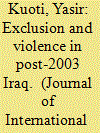| Srl | Item |
| 1 |
ID:
148665


|
|
|
|
|
| Summary/Abstract |
This paper examines the origins of political violence in Iraq. It argues that, in the wake of the democratic transition process in from 2004 to 2005, Iraqi exiles, who were chiefly Shiite Muslims and Kurds appointed by Paul Bremer, Iraq’s U.S. civilian administrator, moved to write a constitution and set up a political system that deliberately marginalized minorities. Since then, the Sunni minority began and continues to engage in or support violence against the state. It suggests that violence and instability in Iraq are to be understood in terms of local contexts of meaning, notably the nature of struggle for political power.
|
|
|
|
|
|
|
|
|
|
|
|
|
|
|
|
| 2 |
ID:
166647


|
|
|
|
|
| Summary/Abstract |
Since the fall of Saddam Hussein in 2003, the name of Ayatollah Ali al-Sistani, the Grand Shiʿi cleric, has come to prominence. Sistani emerged as a key player in the processes that constituted and sustained the post-2003 Iraqi political order, as manifested in key events such as the writing of constitution or the mobilization against the Islamic State (I.S.). Nevertheless, Sistani did not have an official position in Iraq. Unlike the Iranian experience after the 1979 revolution which institutionalized the leading position of faqih (jurist), the Iraqi constitution set Iraq as a democratic, parliamentary state whose religious leaders held no formal offices. Indeed, Sistani rejected the Iranian model as unfit for Iraq’s conditions and societal fabric. Thus, given the absence of a constitutional status for Sistani, how do we understand his authority in Iraq? This article argues that although Sistani’s authority has not been constitutionalized, it was indirectly and roughly ‘formalized’ through practices and laws adopted after 2003. This formalization established a unique and unprecedented relationship between the state and the Shiʿi religious authority in the form of arrangements that, to a degree, blurred the lines between formality and informality and created a shared space of governance.
|
|
|
|
|
|
|
|
|
|
|
|
|
|
|
|